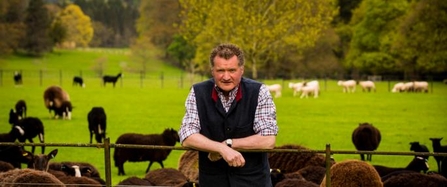
Conserving our soils

Soil - a farmer's biggest asset
Land management is alchemy. Turning water, minerals and bugs into a successful business helps our countryside to thrive and supports the rural economy.
A farmer’s biggest asset is their soil. Good soil health and effective management of soils is vital to the economic future of any land management business. So it is in the best interests of landowners to ensure their soil is managed appropriately. This means taking the long view and investing in the land and its management. Poor commodity prices mean many farmers focus on short-term survival rather than taking a longer term approach. Consequently, some soils have suffered.
Recording soils
Increasing numbers of landowners are looking at the merits of introducing a soil inventory, for their own understanding, or to ensure incoming and outgoing tenants comply with contractual obligations. This is an in-depth study of soil structure, composition and nutrients. There is currently no universal framework for how an inventory might work but it is being considered by large estates as a way to record improvements and deteriorations in soil health and quality during the length of a farm tenancy.
Providing information
One of the most cost effective ways of protecting soils is through exemplar projects, to show land managers what they can do to improve their soils and how this supports their business. Organisations such as the Campaign for the Farmed Environment (CFE) have a crucial role in explaining that healthy soils equal healthy rural businesses.
By demonstrating the benefits of good soil management, we are seeing greater use of combined cropping, minimum tillage and cover crops. These measures and others all deliver better soil conservation and health, better crop yields and a better environment.
Agricultural colleges and professional bodies are encouraged to teach soil science and use of inventories as best practise.
Better monitoring
One of the challenges for soil is to understand condition. We want to see the Government commit to soil quality indicators and the soils monitoring programme as part of both the forthcoming 25-year Food and Farming Plan and 25-year Environment Plan.
In addition, the Government must ensure that soil health monitoring procedures are embedded in policy measures such as agri-environment schemes and are implemented over longer periods of time.
Long-term policy making
Soil health is not a quick win. It can take decades to fully restore soils. It is vital that both of those 25-year plans recognise the importance of soil health and provide clear targets for soil restoration.
Moving forward
It is essential that we have a resilient and profitable agricultural sector. As the saying goes, farmers can be green when they are in the black. The CLA will be working with all parties, including The Wildlife Trusts, as we navigate through the interesting times ahead to ensure land managers are provided with a fully funded and world-leading UK Food, Farming and Environmental policy. This must deliver better outcomes for our economy, our environment and rural communities while also delivering better value for money for the taxpayer.
We should look to design the policy by building on what already works. There is no doubt that, despite some flaws, the system of cross-compliance is an efficient way of delivering a consistent level of good practice across the countryside. Future support systems should take forward the concept of minimum environmental standards. This means including good soil management as a requirement for receiving public support.
Soil is the foundation of our countryside. We must look after it. If we don’t, our landscapes and life as we know it are under threat.
Ross Murray is President of Country Land and Business Association. Find out more at www.cla.org.uk
